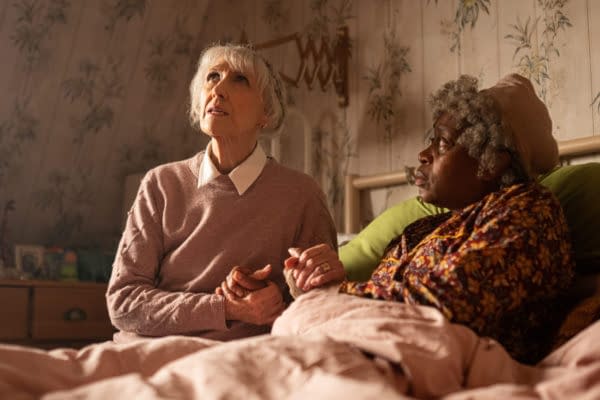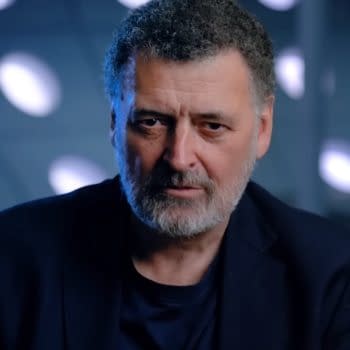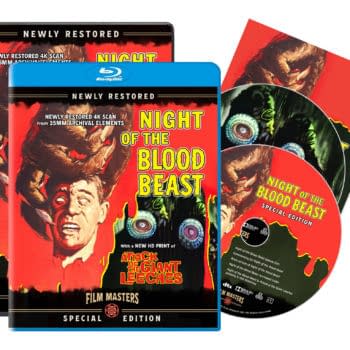Posted in: BBC, Disney+, Doctor Who, TV | Tagged: bonnie langford, doctor who, Millie Gibson, Ncuti Gatwa, russell t davies, Sian Clifford
Doctor Who: Russell T. Davies' Vision Pays Off with "Empire of Death"
Doctor Who Season 1 finale "Empire of Death," sees Russell T. Davis answering all of the big questions with both bombast and poignance.
The entire season of Doctor Who has been leading to this ever since the Christmas Special. "Empire of Death" is where the big questions are paid off. Showrunner Russell T. Davies spent the previous episode, "The Legend of Ruby Sunday," was all set-up. Davies knows everyone is expecting the reveal of Ruby's mother to be mind-blowing. He knows he's set it up for us all to expect it, and then he gives the most emotionally true answer to that mystery that's been staring us in the face all along, especially if you know what the core themes in his 40-plus-year career in television series has always been. The results are clever, the final battle bombastic as ever, but it's really the tears and the poignance with the quiet payoff at the end.
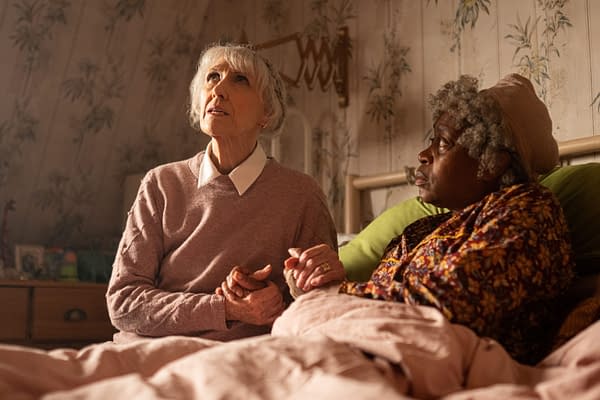
It Was Never Going to Be Susan
Things go pear-shaped right at the start – but first, let's get this over with. The Doctor's granddaughter Susan does not appear except as a quick flash to Carole Ann Ford from a 1960s episode. Sutekh learned of her when he took control of the TARDIS back during the 60th Anniversary Specials and used her name as a trap for the Doctor. Susan's fate will remain a mystery in the series for the foreseeable future. Mrs. Flood (Anita Dobson) is not Susan or the Rani. It's never the Rani, so stop wishing. She still might be a villain, but not here. Here, she's as much a bystander in the wake of Sutekh as everyone else in the world. The mystery of who Mrs. Flood is will continue past this season.
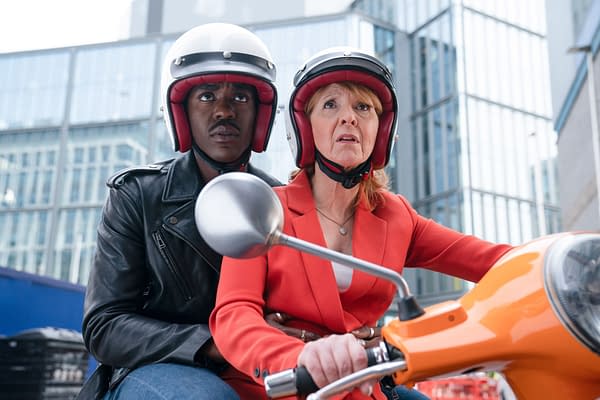
Doctor Who: Literally on the Run from Death
"Empire of Death" sets up the situation immediately – Sutekh has taken over the TARDIS and kills literally everyone on Earth with his sands of death. Everyone at UNIT is redshirted, like everyone – Kate Stewart (Jemma Redgrave), Colonel Ibrahim (Alexander Devrient), boy genius Morris Gibbons (Lenny Rush) despite the machineguns hidden in his Segway, Rose Noble (Yasmin Finney) – is red-shirted. Ruby's mother Carla (Michelle Greenidge), Grandmother Cherry (Angela Wynter), even Mrs. Flood (Anita Dobson), who laments cryptically about not getting to enact her own plans before comforting Cherry as they all turn to dust.
They're out of the picture except for The Doctor (Ncuti Gatwa), Ruby (Millie Gibson), and Mel (Bonnie Langford), who manage to escape in the newly created Memory TARDIS formed from Ruby's memories. So that's where the Memory TARDIS, the star of the UK-exclusive spinoff Tales of the TARDIS, comes from. Timey-wimey means its origin has come after its spinoff. Sutekh killing every planet in the universe by reducing them to dust is very Thanos from Avengers: Infinity War and Avengers: Endgame, and don't think for a moment that Russell T. Davies is unaware of this. The show is streaming on Disney+ along with those movies, after all. Doctor Who is even more meta than ever. Davies one-ups Thanos' snap by showing that Sutekh has brought death not just in the present but across all time, where the women who were all his avatars, played by Susan Twist, spread his gift of death, turning the living into dust. This is death as a dark fairytale for children, and Doctor Who has always partly been about teaching children about death.
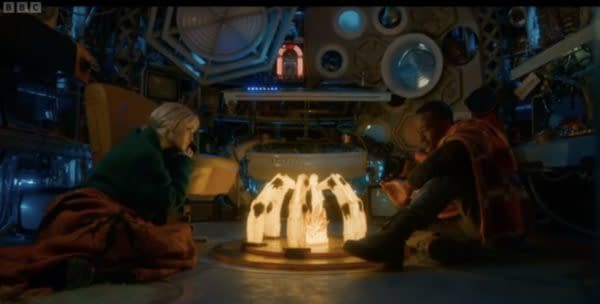
Another Dead Universe
The Doctor, Ruby, and Mel become the only beings left alive and on the run. They land on a dead planet and find one of the last living people, a kind woman who gives the Doctor an important object. She is not Ruby's mother. She's just an ordinary person doing her best for whoever comes across her while she waits for death. She is played by Sian Clifford, best known in Fleabag as the sister, who imbues her one scene with the wariness and sadness of a mother waiting for the end of everything. The object she gives the Doctor is ordinary but utterly important and helps the Doctor on his first step to fight back. Everyone in the universe is slowly dying, and it's in the fading Mel that Sutekh finds them through the dying and dead cells in her body in the creepiest Science Fiction surveillance tool ever, and Mel becomes another of Sutekh's thrall. Mel's struggle against Sutekh in her dying moments is heartbreaking. They're all after the same thing: the identity of Ruby's birth mother and how she's managed to hide from the god of death. Who is she and what kind of power does she have that may have been passed to Ruby? That turns out to be the answer to the Legend of Ruby Sunday all along. And that becomes the lure they use to fight Sutekh.
Doctor Who Payoff No. 1 – The Lost Memories from "73 Yards"
The alternate timeline Ruby lived through in "73 Yards" gets paid off here, though the supernatural mystery that drove that story remains unexplained, as it should, and in seeing moments from that history that Ruby hasn't lived through or remembered, the Doctor and Ruby find the significance of Roger ap Gwilliam (Aneurin Barnard), the most dangerous prime minister the UK ever had, and newsflash! The Doctor played a part in his downfall in 2046. How many British prime ministers has the Doctor brought down by now? But it's not about ap Gwilliam, it's about his compulsion law that every UK citizen had to have their DNA recorded on government computers. So off they go to the dead London of 2046 to find Ruby's mother's DNA and, thus, her name. That's when Sutekh uses the undead Mel to spring his trap and get the Doctor and Ruby before him for his final triumph – to know the secret of Ruby's mother.
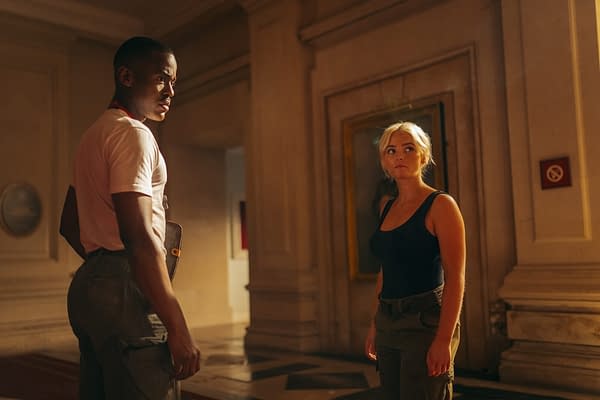
Doctor Who Payoff No. 2: Trapping Death
Only – psych! – NOT. The identity of Ruby's mother was not only the McGuffin of the story but the bait for the Doctor and Ruby to trap Sutekh, regain control of the TARDIS, and drag him back through the Vortex. This is the Doctor we'd been waiting to re-emerge all season – devious, clever, and steps ahead of his enemy, and how he does it is clever, ridiculous, funny, and grand. By introducing Sutekh, who is death itself to the now-dead continuum of all space and time, death negates death and brings back life. The Doctor uses Sutekh to restore all the lives he turned to dust – everyone lives again, and all is well. This time, the Doctor brings death to Sutekh, regretting that in killing Sutekh, the last of his kind, he is also a monster once again. The speech he makes before he destroys Sutekh is the kind you can hear the Twelfth Doctor (Peter Capaldi) making. This is the Doctor as the Wizard who defeats Death and brings everyone back in a fairytale ending, and not out of place on Disney+. The Doctor and Ruby return to UNIT to use the DNA they found in 2046 to track down Ruby's mother at last.
The Quiet Triumph of Ordinary People
It turns out Ruby's mother is not an alien or powerful being but an ordinary person who got pregnant when she was a teen and left her baby at a church to get out of a dangerous household. This has been a core theme of Davies' work, especially on Doctor Who since 2005, that everyone matters, and everyone is important, especially the ordinary people who do their best to get through life and be good. Ruby meets her at last for a tearful reunion, and her story is complete. And the Doctor says goodbye to another companion, again. Ruby's place is with her family, not wandering the stars into dangerous situations. The Doctor is a foundling who brings along other foundlings and orphans; he is not one to take someone away from their family who wants them. The Doctor always leaves when his companion finds a place to belong. He is back to becoming the lonely god wandering all of space and time. His farewell to Ruby is like the first Doctor's farewell to Susan all those years ago, and he knows it. The wound in his heart means he can't say he loves her back. He promises to visit, and we know she's back next season – but for now, goodbye, goodbye, goodbye. It's a satisfying emotional payoff to the season.
Doctor Who is now streaming globally outside the UK on Disney+.
